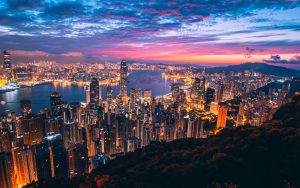“From 1900 to 1945, Japan did more good to China than bad.” Do you agree with this statement? This is a question that appeared in the Hong Kong Diploma for Secondary Education exam, also more commonly known as the HKDSE. The HKDSE also serves as a university entrance exam for secondary school students in Hong Kong.
The Hong Kong Education Bureau is demanding that the Hong Kong Examinations and Assessment Authority conduct a comprehensive review of the controversial exam question. A statement from the Education Bureau claimed that the question “may lead candidates to reach a biased conclusion, seriously hurting the feelings and dignity of the Chinese people who suffered great pain during the Japanese invasion of China.”
The exam question controversy quickly escalated into a political issue as several Chinese state media outlets issued strong responses on the exam question. Xinhua News Agency argued that the exam question was poisonous, and “the rage of all Chinese sons and daughters would not be able to be settled” unless the question is pulled from the exam. People’s Daily claimed that the Hong Kong education system had instigated violence against the Hong Kong police force and needed to be “cut to the bones and clear the poisons.” Another Chinese state media outlet, Beijing Daily, accused the examiners of being “Chinese traitors.” Chinese state media also listed other exam questions that were deemed to be “incorrect”: In 2016, an exam question asked whether China’s economic reforms after 1978 significantly changed the country. Another question which asked students to evaluate if Hong Kong showed any improvements in democratic values and racial equalities between 1951 to 1997 was also considered to be not aligned with acceptable values in China.
Former Chief Executive CY Leung posted on Facebook encouraging residents to report teachers who have low moral standards to authorities. Leung also claimed that there is a significant amount of “negative energy” from the Hong Kong education sector.
Leung’s beliefs are shared by his successor, Carrie Lam. The incumbent Hong Kong SAR chief executive said earlier in May that the liberal studies curriculum helped fuel last year’s violent pro-democracy protests. Lam also vowed to come up with plans to reform the teachings that are feeding schoolchildren in the city “false and biased information” and that it’s important to protect students from being “poisoned.”
This is not the first time that the Hong Kong government has taken aim at the city’s education curriculums. In 2012, the government attempted to implement a moral and national education program. The program consisted of controversial lessons on appreciating mainland China. The government plan triggered several protests opposing the proposed changes to the city’s education curriculum. Facing discontent and massive protests, the Hong Kong government was forced to concede in September by pledging that moral and national education programs will not be compulsory.
For Hong Kong and mainland China, there are significant differences when it comes to education. While Hong Kong history curriculums aim to develop the skills of critical thinking, making sound judgments and effective communication through exploring historical issues, history textbooks in mainland China have no mention of several key events such as the Tiananmen Square Massacre. For historical events that are deemed to be politically sensitive, such as the Cultural Revolution and the Great Leap Forward, Chinese history textbooks attempt to downplay the negative impacts of those events. Essays from Chinese writer Lu Xun were removed from Chinese literacy textbooks in 2013. Lu Xun was the pen name of Zhou Shuren. Zhou’s literature was once deemed to be accurate reflections of Chinese society, yet those pieces are becoming a rising risk for the Chinese regime as it becomes more and more authoritative in its major policies.
From imposing harsh censorship to attempting to rewrite history, the Chinese Communist regime sees its education curriculum not only as a system to empower its citizens but also as a tool for indoctrination. Through its education curriculums, China continues to push for support on its major political agenda items such as insisting to claim Taiwan as part of the country and promote the regime’s legitimacy on creating the term “socialism with Chinese characteristics.” The Chinese education system also limits freedom of expression through monitoring and reporting university professors who are not aligned with the Chinese government’s political propaganda.
Education curriculums in Hong Kong are nowhere close to those in mainland China. From encouraging critical thinking to examining historical events in modern China, Hong Kong’s curriculums nurture students to become informed citizens actively participating in public affairs and local politics. These skills are developed through education, together with press freedom within the special administrative region, and are becoming the backbones of the city’s demand for full democracy and accountable governance.
From having tone-deaf attitudes toward the protesters demanding freedom and democracy to planning to change the city’s education curriculums, the Hong Kong government shows no signs of listening to its constituents. As Carrie Lam continues to push for more repressive measures against the demands of full democracy, it becomes more and more alarming that Hong Kong’s education system may be in jeopardy in the near future.

































